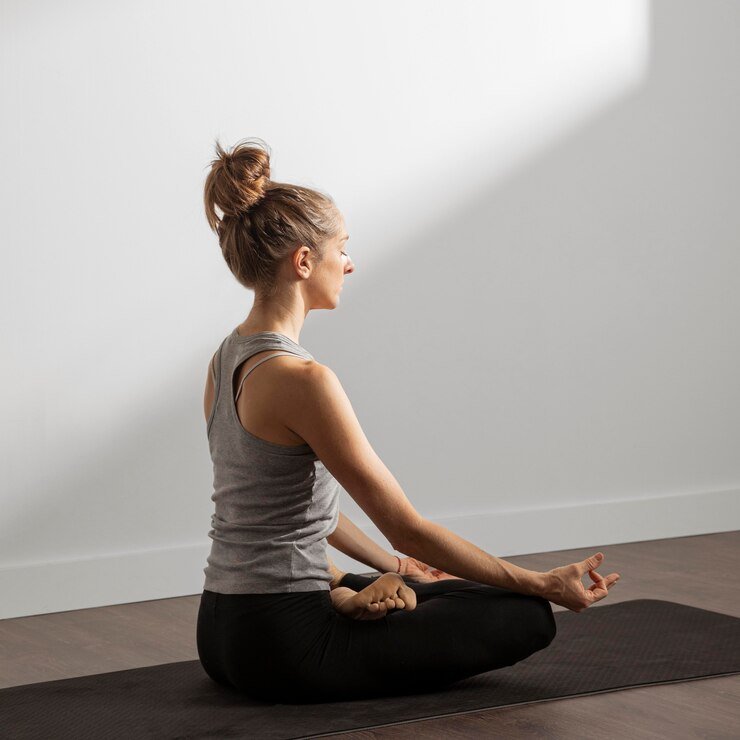Yin Yoga retreats offer a profound opportunity to reset the nervous system and release deeply held stress patterns by targeting both the physical body and the subtle energy body. Central to this practice are the meridian pathways (based on Traditional Chinese Medicine) and the use of Yoga Nidra, a powerful practice of conscious relaxation. Together, these elements enhance the benefits of a Yin Yoga retreat, allowing participants to access deep states of healing, relaxation, and transformation.
The Role of Meridians in Yin Yoga
What Are Meridians?
In Traditional Chinese Medicine (TCM), meridians are channels through which Qi (life force energy) flows, affecting the health of the body and mind. Yin Yoga postures are intentionally designed to target these meridian lines, which correspond to specific organs and emotional states. By stimulating these meridians through long-held poses, energy blockages are released, promoting physical and emotional well-being.
Key Meridian Lines Targeted in Yin Yoga
- Liver & Gallbladder Meridians (Associated with emotional detox)
- Location: Along the inner and outer thighs.
- Postures: Butterfly Pose, Shoelace Pose, Reclining Twist.
- Benefits: Encourages emotional release and detoxification; promotes patience and compassion.
- Kidney & Urinary Bladder Meridians (Linked to fear and stamina)
- Location: Back of the legs and spine.
- Postures: Caterpillar Pose, Sphinx Pose, Child’s Pose.
- Benefits: Supports adrenal function and inner strength; releases fear and anxiety.
- Lung & Large Intestine Meridians (Associated with grief and letting go)
- Location: Upper body, shoulders, and arms.
- Postures: Melting Heart Pose, Thread-the-Needle, Supported Bridge Pose.
- Benefits: Boosts immunity and emotional resilience; helps in releasing unresolved emotions.
- Spleen & Stomach Meridians (Governs nourishment and grounding)
- Location: Front of the body and inner legs.
- Postures: Dragon Pose, Frog Pose, Reclining Hero Pose.
- Benefits: Promotes a sense of stability and grounding; aids digestion and self-nurturance.
How Meridians Enhance Yin Yoga Practice
During a Yin Yoga retreat, practitioners experience how stimulating these meridians unlock emotional and energetic blockages. These effects are often amplified through breathwork, meditation, and Yoga Nidra, ensuring not only physical benefits but also deep psychological and spiritual healing.
The Power of Yoga Nidra in Yin Yoga Retreats
What Is Yoga Nidra?
Yoga Nidra, often called “yogic sleep,” is a guided meditation technique that takes participants to the threshold between wakefulness and sleep. It allows the body to rest deeply while the mind remains conscious and aware. Yoga Nidra is used in Yin Yoga retreats to enhance relaxation, integrate the retreat’s experiences, and access deeper layers of the subconscious mind.
Benefits of Yoga Nidra
- Reduces Stress and Anxiety: Yoga Nidra activates the parasympathetic nervous system, helping to manage stress.
- Improves Sleep: Practicing Yoga Nidra promotes restful sleep and alleviates insomnia.
- Emotional Healing: It creates a safe space to process and release unresolved emotions.
- Enhances Clarity and Creativity: Yoga Nidra enables deep mental rest, leading to insights and renewed creativity.
How Yoga Nidra Complements Yin Yoga
Yin Yoga physically prepares the body for deeper relaxation by softening tension in muscles and connective tissues. After a Yin session, participants are guided into Yoga Nidra, where they rest in Savasana (Corpse Pose) while following a structured meditation. This practice helps to:
- Anchor the benefits of Yin Yoga by integrating emotional and energetic shifts.
- Support mental detoxification, releasing unconscious patterns and thoughts.
- Deepen awareness by fostering stillness in both body and mind.
In many retreats, evening Yoga Nidra sessions provide a soothing transition into sleep, ensuring the body continues its healing process overnight.
How Yin Yoga and Yoga Nidra Work Together on a Retreat
A typical retreat schedule integrates both practices to maximize relaxation and healing. Below is an example of how these two practices complement each other during a retreat:
- Morning Yin Yoga Practice: Activates meridians and promotes energy flow.
- Afternoon Workshops: Explore meridian theory, fascia release, or subtle body energy.
- Evening Yoga Nidra Session: Guided relaxation to process the day’s experiences and promote emotional healing.
Over the course of several days, this combination creates a profound inner journey, leaving participants feeling rejuvenated, balanced, and more connected with themselves.
Conclusion: A Transformative Experience
Yin Yoga retreats provide the perfect environment for relaxation, reflection, and emotional healing. By integrating meridian theory with Yoga Nidra, these retreats offer a holistic approach to well-being, addressing not only the physical body but also the mind and emotions. Participants return from such retreats feeling lighter, clearer, and more in tune with their inner selves.
Whether you’re seeking stress relief, emotional healing, or personal growth, a Yin Yoga retreat offers a powerful way to recharge and realign with your deepest self.
FAQ: Yin Yoga Retreats
1. What is Yin Yoga?
Yin Yoga is a slow-paced style of yoga where postures are held for several minutes to target deep connective tissues, ligaments, and joints. It focuses on improving flexibility, circulation, and mental relaxation.
2. Who can attend a Yin Yoga retreat?
Yin Yoga retreats are suitable for all levels, from beginners to advanced practitioners. These retreats are ideal for anyone seeking relaxation, flexibility, emotional healing, or personal growth.
3. Do I need prior experience to join a Yin Yoga retreat?
No prior yoga experience is required. Yin Yoga is gentle, accessible, and adaptable to all levels of flexibility and fitness.
4. What are the benefits of attending a Yin Yoga retreat?
- Improved flexibility and joint health
- Stress relief and emotional healing
- Enhanced mindfulness and inner peace
- Improved sleep and reduced anxiety
- Deeper connection with yourself and others
5. What do I need to pack for a Yin Yoga retreat?
- Comfortable, breathable clothing
- A personal yoga mat (optional)
- Journal for reflection
- Sunscreen and insect repellent (for outdoor locations)
- Water bottle and reusable essentials
6. How does Yin Yoga differ from other types of yoga?
Unlike dynamic forms such as Vinyasa or Ashtanga, Yin Yoga is passive and meditative. It emphasizes long holds (2–5 minutes or more) to stretch deep connective tissues and stimulate energy channels (meridians).
7. What are meridians, and why are they important in Yin Yoga?
Meridians are energy pathways in the body, similar to the concept of nadis in yogic philosophy. In Yin Yoga, postures are designed to stimulate these pathways, promoting energy flow and emotional release.
8. What is Yoga Nidra, and how is it used in Yin Yoga retreats?
Yoga Nidra, or “yogic sleep,” is a guided meditation technique that brings you to a state of deep relaxation. In Yin Yoga retreats, it complements the practice by helping participants integrate physical, emotional, and mental experiences for complete rejuvenation.
9. What can I expect from a typical day at a Yin Yoga retreat?
- Morning: Yin Yoga and mindfulness meditation
- Afternoon: Workshops or free time for personal reflection
- Evening: Yin Yoga or Yoga Nidra session
- Healthy, vegetarian/vegan meals throughout the day
- Optional wellness therapies, such as sound healing or massage
10. How long is a Yin Yoga retreat?
Retreats can vary in length, ranging from weekend getaways (2–3 days) to immersive retreats of 7–14 days. Choose a retreat that fits your schedule and desired level of immersion.
11. Are meals included in the retreat package?
Most Yin Yoga retreats provide healthy vegetarian or vegan meals, often prepared with locally sourced ingredients. Some retreats also offer detox or Ayurvedic meal options.
12. Can I attend a Yin Yoga retreat alone?
Yes, many participants attend retreats solo to focus on personal growth and relaxation. Yin Yoga retreats provide a welcoming and inclusive environment, making it easy to connect with like-minded people.
13. Are Yin Yoga retreats expensive?
The cost of a retreat varies depending on location, duration, accommodation, and included amenities. Budget-friendly options are available, as well as luxurious retreats with premium services.
14. Will I have free time during the retreat?
Yes, most retreats include free time for participants to explore the surroundings, relax, or enjoy personal activities such as journaling or swimming.
15. How can I prepare for a Yin Yoga retreat?
- Practice a few Yin Yoga sessions at home to familiarize yourself with the style.
- Focus on mindfulness and breathing exercises.
- Set personal intentions or goals for the retreat.
- Pack light and bring an open mind.
Get in Touch:
Yin Yoga Practice | Yin Yoga Retreat Germany | Yin Yoga Teacher Training Germany | 200-Hour Yin Yoga Certification

